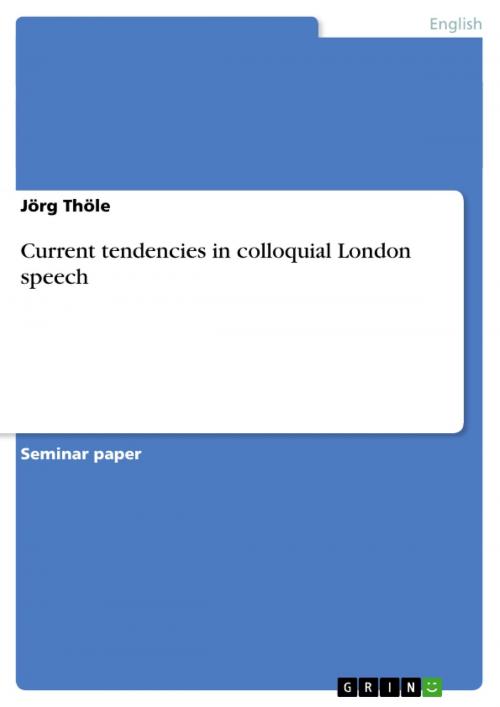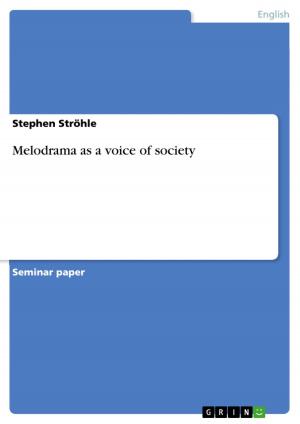| Author: | Jörg Thöle | ISBN: | 9783640173631 |
| Publisher: | GRIN Publishing | Publication: | September 23, 2008 |
| Imprint: | GRIN Publishing | Language: | English |
| Author: | Jörg Thöle |
| ISBN: | 9783640173631 |
| Publisher: | GRIN Publishing |
| Publication: | September 23, 2008 |
| Imprint: | GRIN Publishing |
| Language: | English |
Seminar paper from the year 2007 in the subject English Language and Literature Studies - Linguistics, grade: 2,0, University of Münster, course: London's Englishes, 13 entries in the bibliography, language: English, abstract: (...) The speech variant of the next generation up the ladder is a better candidate for being the source of language change, as the peculiarities of teenagers' speech are not peculiar features of individual speakers, but they exist by convention, which means that at least the speakers of one group must have already agreed upon this specific feature. This makes it a lot easier for any innovation to carry on into adult speech. Furthermore, it is more likely for youth language features to become standard than that of other varieties because on the one hand, all youths will eventually become adults, while on the other hand, youth language is not a variety restricted to a very specific situation but by definition the default way of speaking for teenagers, so to say. So unlike other varieties, youth language does apply to a great part of the speech community in general. Therefore, it should be very easy for features of youth language to carry on into adult language by just not being dropped by their speakers. However, this assumption of teenage language being the main source for language change is of course not self-evident. It is therefore of high interest to have a further look whether such a proposition is really true or not. Therefore, it is good idea to have a closer look at adolescents' as well as adults' everyday speech and compare them with regards to their linguistic innovations. If the above assumption is true, then linguistic innovations should appear later in adult language than in teenagers' language. This is what will be done in this work. After a short excursus on important aspects of the theory of grammaticalisation, we will have a close look at adolescents' speech and its peculiarities through some works on the COLT study of 1993. We will then examine a small corpus on adults' colloquial language in 2007. In the end, we will compare the results to see what this tells us about language change and the role of teenage language therein. We will mainly be focused on grammatical, i. e. syntactical or morphological aspects, respectively. Phonetic aspects are for the most part excluded except for the phenomenon called t-glottalisation, which is easy to identify and also very interesting in the context of a work on London English.
Seminar paper from the year 2007 in the subject English Language and Literature Studies - Linguistics, grade: 2,0, University of Münster, course: London's Englishes, 13 entries in the bibliography, language: English, abstract: (...) The speech variant of the next generation up the ladder is a better candidate for being the source of language change, as the peculiarities of teenagers' speech are not peculiar features of individual speakers, but they exist by convention, which means that at least the speakers of one group must have already agreed upon this specific feature. This makes it a lot easier for any innovation to carry on into adult speech. Furthermore, it is more likely for youth language features to become standard than that of other varieties because on the one hand, all youths will eventually become adults, while on the other hand, youth language is not a variety restricted to a very specific situation but by definition the default way of speaking for teenagers, so to say. So unlike other varieties, youth language does apply to a great part of the speech community in general. Therefore, it should be very easy for features of youth language to carry on into adult language by just not being dropped by their speakers. However, this assumption of teenage language being the main source for language change is of course not self-evident. It is therefore of high interest to have a further look whether such a proposition is really true or not. Therefore, it is good idea to have a closer look at adolescents' as well as adults' everyday speech and compare them with regards to their linguistic innovations. If the above assumption is true, then linguistic innovations should appear later in adult language than in teenagers' language. This is what will be done in this work. After a short excursus on important aspects of the theory of grammaticalisation, we will have a close look at adolescents' speech and its peculiarities through some works on the COLT study of 1993. We will then examine a small corpus on adults' colloquial language in 2007. In the end, we will compare the results to see what this tells us about language change and the role of teenage language therein. We will mainly be focused on grammatical, i. e. syntactical or morphological aspects, respectively. Phonetic aspects are for the most part excluded except for the phenomenon called t-glottalisation, which is easy to identify and also very interesting in the context of a work on London English.















